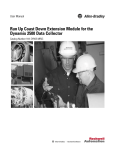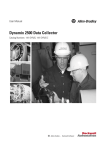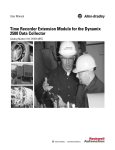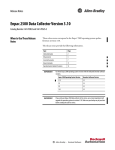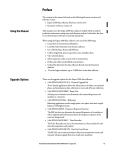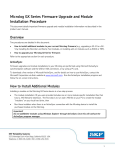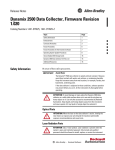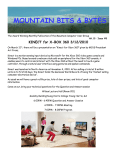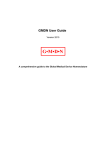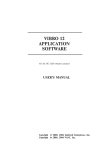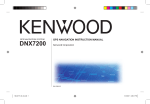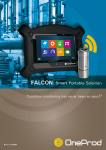Download Bump Test Extension Module for the Dynamix 2500 Data Collector
Transcript
User Manual Bump Test Extension Module for the Dynamix 2500 Data Collector Catalog Number 1441-DYN25-MBMP Important User Information Solid-state equipment has operational characteristics differing from those of electromechanical equipment. Safety Guidelines for the Application, Installation and Maintenance of Solid State Controls (publication SGI-1.1 available from your local Rockwell Automation sales office or online at http://www.rockwellautomation.com/literature/) describes some important differences between solid-state equipment and hard-wired electromechanical devices. Because of this difference, and also because of the wide variety of uses for solid-state equipment, all persons responsible for applying this equipment must satisfy themselves that each intended application of this equipment is acceptable. In no event will Rockwell Automation, Inc. be responsible or liable for indirect or consequential damages resulting from the use or application of this equipment. The examples and diagrams in this manual are included solely for illustrative purposes. Because of the many variables and requirements associated with any particular installation, Rockwell Automation, Inc. cannot assume responsibility or liability for actual use based on the examples and diagrams. No patent liability is assumed by Rockwell Automation, Inc. with respect to use of information, circuits, equipment, or software described in this manual. Reproduction of the contents of this manual, in whole or in part, without written permission of Rockwell Automation, Inc., is prohibited. Throughout this manual, when necessary, we use notes to make you aware of safety considerations. WARNING: Identifies information about practices or circumstances that can cause an explosion in a hazardous environment, which may lead to personal injury or death, property damage, or economic loss. ATTENTION: Identifies information about practices or circumstances that can lead to personal injury or death, property damage, or economic loss. Attentions help you identify a hazard, avoid a hazard, and recognize the consequence SHOCK HAZARD: Labels may be on or inside the equipment, for example, a drive or motor, to alert people that dangerous voltage may be present. BURN HAZARD: Labels may be on or inside the equipment, for example, a drive or motor, to alert people that surfaces may reach dangerous temperatures. IMPORTANT Identifies information that is critical for successful application and understanding of the product. Allen-Bradley, Rockwell Software, Rockwell Automation, Dynamix, Enpac, Emonitor, and TechConnect are trademarks of Rockwell Automation, Inc. Trademarks not belonging to Rockwell Automation are property of their respective companies. Table of Contents Preface Optional Extension Modules. . . . . . . . . . . . . . . . . . . . . . . . . . . . . . . . . . . . . . . . 5 Additional Resources . . . . . . . . . . . . . . . . . . . . . . . . . . . . . . . . . . . . . . . . . . . . . . . 6 Chapter 1 Installing Optional Extension Modules Install Extension Modules . . . . . . . . . . . . . . . . . . . . . . . . . . . . . . . . . . . . . . . . . . 7 Uninstall Extension Modules. . . . . . . . . . . . . . . . . . . . . . . . . . . . . . . . . . . . . . 10 Manage Extension Modules . . . . . . . . . . . . . . . . . . . . . . . . . . . . . . . . . . . . . . . 12 Extension Module Battery Status Indicators . . . . . . . . . . . . . . . . . . . . . . . . 13 Chapter 2 Bump Test Extension Module Set Up Bump Test Measurements . . . . . . . . . . . . . . . . . . . . . . . . . . . . . . . . . Collect Bump Test Measurements . . . . . . . . . . . . . . . . . . . . . . . . . . . . . . . . . Save a Bump Test Setup and Measurement . . . . . . . . . . . . . . . . . . . . . . . . . Recall a Setup . . . . . . . . . . . . . . . . . . . . . . . . . . . . . . . . . . . . . . . . . . . . . . . . . . . . Review Bump Test Measurements . . . . . . . . . . . . . . . . . . . . . . . . . . . . . . . . . Save Files to Your Computer . . . . . . . . . . . . . . . . . . . . . . . . . . . . . . . . . . . . . . Back Up Your files . . . . . . . . . . . . . . . . . . . . . . . . . . . . . . . . . . . . . . . . . . . . . . . Delete Bump Test Files . . . . . . . . . . . . . . . . . . . . . . . . . . . . . . . . . . . . . . . . . . . 16 19 20 21 23 25 26 28 Index Rockwell Automation Publication 1441-UM002A-EN-P - May 2011 3 Table of Contents Notes: 4 Rockwell Automation Publication 1441-UM002A-EN-P - May 2011 Preface This manual describes the Bump Test and how to apply it using the Dynamix 2500 data collector. You install the extension module with the Bump Test Secure Digital (SD) card. See Installing Optional Extension Modules on page 7 for installation instructions. When using the Dynamix 2500 data collector and the Bump Test extension module, you can do the following: • Determine natural (or resonant) frequencies of a machine or structure. • Identify a structure’s resonant modes. • Change the resonance frequency to reduce or eliminate damaging vibration levels. Optional Extension Modules These are the optional extension modules for the Dynamix 2500 data collector: • 1441-DYN25-4C, 4-channel Activation (1) The 4-channel activation lets you take 3 and 4 channel magnitude, time waveform, spectra, and Offroute measurements. • 1441-DYN25-MBMP Bump Test The bump test (or hammer test) determines the natural frequencies of a machine or a structure. • 1441-DYN25-MBAL Balancing The balancing test resolves single-plane, two-plane, and static-couple balances with high precision. • 1441-DYN25-MFRF Frequency Response Function The FRF test lets you determine the natural frequencies of a machine as well as sophisticated information about the frequency response of the structure being tested. • 1441-DYN25-MREC Time Recorder The Time Recorder test uses a the instrument as a data recorder for realtime data acquisition and analysis. • 1441-DYN25-MRUC Run Up Coast Down The RUCD test records and analyzes data from intermittent events and transient vibration signals from non-steady state machines. See Additional Resources on page 6 for a listing of available publications. (1) This is an activation license for the Dynamix 2500 data collector. Rockwell Automation Publication 1441-UM002A-EN-P - May 2011 5 Preface Additional Resources These documents contain additional information concerning related products from Rockwell Automation. Resource Description Dynamix 2500 Data Collector User Manual, publication 1441-UM001 Describes the Dynamix 2500 data collector, which provides predictive maintenance by using noise and vibration analysis. Frequency Response Function Extension Module for the Dynamix 2500 Data Collector User Manual, publication 1441-UM003 Describes how to determine the natural frequencies of a machine or structure using modal hammer. Balancing Extension Module for the Dynamix 2500 Data Collector User Manual, publication 1441-UM004 Describes the direct method to balance your rotating machinery in one or two planes. Time Recorder Extension Module for the Dynamix 2500 Data Collector User Manual, publication 1441-UM005 Describes how to use the data collector as a data recorder for real-time data acquisition, for post processing, and analysis. Run Up Coast Down Extension Module for the Dynamix 2500 Data Collector User Manual, publication 1441-UM006 Describes how to record and analyze data from intermittent events and transient vibration signals from non-steady state machines. Emonitor User’s Guide, publication EMONTR-UM001 Describes data management for predictive maintenance services. Dynamix 2500 Data Collector Kit Release Notes, publication 1441-RN001 Provides important information on the latest updates, for example, firmware, certifications, warnings, and hardware changes for the data collector. Dynamix 2500 Data Collector Optional Extension Modules Release Notes, publication 1441-RN002 Provides important information on how to install the optional extension modules on to the Dynamix 2500 data collector. Industrial Automation Wiring and Grounding Guidelines, publication 1770-4.1 Provides general guidelines for installing a Rockwell Automation industrial system. Product Certifications website, http://www.ab.com Provides declarations of conformity, certificates, and other certification details. You can view or download publications at http://www.rockwellautomation.com/literature. To order paper copies of technical documentation, contact your local Allen-Bradley distributor or Rockwell Automation sales representative. 6 Rockwell Automation Publication 1441-UM002A-EN-P - May 2011 Chapter 1 Installing Optional Extension Modules The data collector uses the Extension Manager to install and uninstall extension modules. These extension modules are licensed and ordered separately from the basic entry-level product. Install Extension Modules Topic Page Install Extension Modules 7 Uninstall Extension Modules 10 Manage Extension Modules 12 Extension Module Battery Status Indicators 13 The installation Secure Digital (SD) cards that you receive work with any Dynamix 2500 data collector. Once you have installed an extension module on the data collector, the card is locked so that it can be used with only that instrument. IMPORTANT One installation SD card is required for each instrument that needs to be upgraded. You can uninstall extension modules, if required. When uninstalling an extension module, you have the option to free up the license so you can install the extension module on another data collector. This makes the extension module available to be transferred between units. IMPORTANT When ever you re-run the OS Loader software, you will re-load only the main OS firmware. The OS loader will backup licence files and data, but not the optional extension modules. Once you have updated the OS firmware, install the latest version of your optional extension modules. See the Dynamix 2500 Data Collector User Manual, 1441-UM001, for more information. Follow these instructions to install an extension module. 1. Open the base cover at the bottom of the Dynamix 2500 data collector. 2. Place the extension module Secure Digital (SD) card contact-side-up into the unit until it is firmly seated in place. 3. Close the base cover. Rockwell Automation Publication 1441-UM002A-EN-P - May 2011 7 Chapter 1 Installing Optional Extension Modules 4. Apply power to the data collector. 5. From the Main menu, choose Setup Utility and press Enter. 6. Press 0 (Shift) to display the second set of functions. Extension Manager The Extension Manager function remains on the screen for about three seconds after releasing the 0 (Shift). 7. Press F1 (Extn Mgr). 8 Rockwell Automation Publication 1441-UM002A-EN-P - May 2011 Installing Optional Extension Modules Chapter 1 The Extension Manager screen appears, showing the current extension module installations. 8. Press 0 (Shift) to display the Install Extension function. 9. Press F2 (Install) to install the new extension module. When the installation is complete, a confirmation prompt appears. 10. Press F4 (OK). The new extension module appears in the list. 11. Press F4 (Esc) to exit the Extension Manager screen. Rockwell Automation Publication 1441-UM002A-EN-P - May 2011 9 Chapter 1 Installing Optional Extension Modules Uninstall Extension Modules Follow these instructions to uninstall an extension module. 1. Press 0 (Shift) from the Setup Utility screen to display the Extension Manager function. The Extension Manager function remains on the screen for about three seconds after releasing the 0 (Shift). Extension Manager 2. Press F1 (Extn Mgr). The Extension Manager screen appears. This screen lists the extension modules currently installed and the on the unit. 3. Select the extension module you want to uninstall and press F3 (Select). F3 (Select) toggles the selection on and off. 10 Rockwell Automation Publication 1441-UM002A-EN-P - May 2011 Installing Optional Extension Modules Chapter 1 A checkmark appears next to that extension module. 4. Press F1 (Uninstall). A confirmation message appears. 5. Make sure your installation card is inserted into the instrument. IMPORTANT The extension module is uninstalled and the license on the card is released so that the card can be used to install the extension module on another Dynamix 2500 data collector. If the installation card is not inserted in the data collector and no card is found or the card does not have the extension module license for the unit, you are prompted to insert the correct installation card or continue without freeing the license. 6. Press F2 (Yes) to uninstall the extension module. 7. Press F4 (Esc) to exit the Extension Manager screen. Rockwell Automation Publication 1441-UM002A-EN-P - May 2011 11 Chapter 1 Installing Optional Extension Modules Manage Extension Modules The Dynamix 2500 data collector lets you hide installed extension modules from the Main Menu. You may need to hide an advanced extension module icon, for example, RUCD and FRF, from an inexperienced user. IMPORTANT Once an extension module is hidden, its icon is not represented on the Main Menu or displayed in the Dynamix 2500 data collector About screen. Follow these instructions to hide or show an extension module icon on the Main Menu. 1. Press 0 (Shift) on the Setup Utility screen to display the Extension Manager function. The Extension Manager function should remain on the screen for approximately three seconds after releasing 0 (Shift). 2. Press F1 (Extn Mgr). The Extension Manager screen appears. The Extension Manager displays a list of installed extension modules. The extension modules that are hidden are shown in [square brackets]. The F2 function key toggles between Hide and Show depending on if the selected extension module is hidden. TIP 12 You have to exit and re-enter the Extension Manager after hiding an extension module to have the Show function appear. Rockwell Automation Publication 1441-UM002A-EN-P - May 2011 Installing Optional Extension Modules Chapter 1 3. Select the extension module that you want to hide or show and press F2 (Show/Hide). TIP If you want to show or hide multiple extension modules simultaneously, select each extension module and press F3 (Select). A checkbox appears next to each selected extension module. If you select multiple extension modules and some are hidden while others are shown, F2 (Show/Hide) reflects the status of the selected extension module. 4. Press F4 (Esc) to exit the Extension Manager. Extension Module Battery Status Indicators The battery status icons show the strength of the battery. Table 1 - Extension Module Battery Icon Descriptions Battery Icon Meaning Battery status is good: >30% life remaining. Battery status is low: >10% life remaining. Battery status is very low: <10% life remaining. Battery is charging. Rockwell Automation Publication 1441-UM002A-EN-P - May 2011 13 Chapter 1 Installing Optional Extension Modules Notes: 14 Rockwell Automation Publication 1441-UM002A-EN-P - May 2011 Chapter 2 Bump Test Extension Module The Bump Test extension module is an optional module for the Dynamix 2500 data collector. You install the extension module with the Bump Test SD storage card. See Installing Optional Extension Modules on page 7 for installation instructions. Topic Page Set Up Bump Test Measurements 16 Collect Bump Test Measurements 19 Save a Bump Test Setup and Measurement 21 Recall a Setup 21 Review Bump Test Measurements 23 Save Files to Your Computer 25 Back Up Your files 26 Delete Bump Test Files 28 The Bump Test extension module for the Dynamix 2500 data collector provides an effective way of determining natural (or resonant) frequencies of a machine or structure. A bump test (or hammer test) determines the natural frequencies of a machine or a structure. The idea behind the test is that when an object is impacted or bumped, the object’s natural or resonant frequencies are excited. If a measurement is taken while the object is vibrating due to the impact, peaks will result and pinpoint the object’s natural frequencies. The Dynamix 2500 data collector can be used to capture this frequency response and illustrates the resonant frequencies. Vibration forces transmitted by rotating machines often excite natural resonance in structures attached to the machine. When these structural resonances appear, vibration levels are amplified and can result in fatigue failures. Structural resonances can also mask the cause of a machine’s vibration making it difficult to implement corrective machine maintenance. The Bump Test identifies a structure’s resonant modes and provides you with the opportunity to change the resonance frequency to reduce or eliminate damaging vibration levels. Rockwell Automation Publication 1441-UM002A-EN-P - May 2011 15 Chapter 2 Bump Test Extension Module Set Up Bump Test Measurements Follow these steps to configure the parameters for the measurement. 1. Connect the transducer to the Dynamix 2500 data collector. 2. Attach the transducer to the machine case or structure. 3. Select Bump Test on the Main Menu and press Enter. The Bump Test screen appears. • Setup displays the Bump Test setup parameters and begins data collection. • Recall lets you recall previously saved Bump Test settings to perform another Bump Test using the same settings. • Review Data lets you review saved Bump Test data. 4. Select Setup and press Enter to set up the Bump Test parameters and begin to collect data. Save – Saves the current bump test settings. Enter a filename to identify the bump test settings. Start – Take bump test data using the current settings. Back – Returns you to the Bump Test menu. 16 Rockwell Automation Publication 1441-UM002A-EN-P - May 2011 Bump Test Extension Module Chapter 2 See Bump Test Parameter Descriptions on page 17 for complete descriptions of the parameters. 5. Configure the Bump Test setup parameters. Table 2 - Bump Test Parameter Descriptions Parameter Description Value Num. Channels Number of Channels you are using in the Bump Test. 1 (X) 2 (X and Y) 3 (X, Y, and Z) 4 (X, Y, Z, R) Sensor Type Specifies the type of sensor used (typically Accel G). Note that the specified sensor type determines available options and engineering units for subsequent setup fields. Accel (G) (default) Accel m/s2 Vel IPS Vel mm/s Disp um Disp mil Volts AC Volts DC Sensor Sensitivity Enter transducer sensitivity in millivolts (mV) per Engineering Unit (EU) (typically 100 mV/g). mV/EU Range (EU) (Full Scale) Define the spectrum’s maximum full-scale amplitude value. 1 (default), 2, 5, 10, 20, 50, 100, 200, 500, 1000 Typically 20 G for Accel X-axis units Filter Specify frequency units for graphic displays. Hz (default) Displays high-pass filter settings. 2 Hz (default) CPM Off, 0.36 Hz, 1.1 Hz, 2Hx, 10 Hz, 70 Hz Freq Range (Fmax) The FFT upper full-scale frequency, up to 40,000 Hz (2,400,000 CPM). Rockwell Automation Publication 1441-UM002A-EN-P - May 2011 1000 Hz (default) 17 Chapter 2 Bump Test Extension Module Table 2 - Bump Test Parameter Descriptions Parameter Description Value Lines Specify the measurement lines of resolution. 400 (default) The increased resolution requires increased time for data collection and consumes more storage memory. Avg. Type 100, 200, 400, 800, 1600, 3200, 6400, 12800, 25600 Specify the Peak Hold averaging. Pk Hold The data collector holds the highest spectral peak for each hammer hit. Exponential (default) For exponential averaging, the data collector averages multiple hits to minimize the noise level; however you must pause the averaging process after the last hit. Display Y-axis Specify the type of y-axis scaling. Typically set to Linear. Linear (default) Logarithmic Logarithmic dB 6. Press F2 (Save) to name and save the current settings for future recall. 7. Press F3 (Start) to begin collecting data. The Bump Test – Taking Data screen appears. 18 Rockwell Automation Publication 1441-UM002A-EN-P - May 2011 Bump Test Extension Module Collect Bump Test Measurements Chapter 2 After setting up the parameters, you are ready to collect Bump Test data. 1. Press F3 (Start) to collect data. The Bump Test-Taking Data screen appears. 2. Using an impacting device, hit the machine. Notice the natural frequency spectral peaks displayed on the screen. 3. Commence bump test hammer hits to display natural frequency spectral peaks. 4. Move the cursors to identify natural frequencies. • Press F3 (Pause) to pause the data on the screen. Pause toggles to the Start function. Press F3 (Start) to start collecting data again. • The Left and Right arrows move the cursor across the x-axis to determine the natural frequencies. • The Up and Down arrows change the scale on the y-axis. Rockwell Automation Publication 1441-UM002A-EN-P - May 2011 19 Chapter 2 Bump Test Extension Module Peak Find cursor Harmonic cursor • Press P (7) to move the cursor to the next significant peak. • Press H (4) to display the harmonic cursors. Each time you press H, it toggles through the functions. Table 3 - Significant Peak Functions Save a Bump Test Setup and Measurement On pressing H Function Once Enables the harmonic cursors. Press the Left and Right arrows to move the harmonic cursors. Twice The cursor line is displayed with the harmonic cursors. Press the Left and Right arrows to move only a single cursor, leaving the harmonic cursors locked in position. Thrice Turns the harmonic cursors off; use only a single cursor. You can save the Bump Test setup parameters and measurements to a file that you can recall at a later time. You can save a Bump Test setup and measurement any time the Save function appears on the screen. The Dynamix 2500 data collector stores bump test measurements in comma-separated value format (.csv) in the Internal Disk/Analyzer folder. These .csv files can be viewed with the Microsoft Excel software. Follow these steps to save a file. 1. Take a reading. 2. Press F2 (Save). The Bump Test - Save Data screen appears. 20 Rockwell Automation Publication 1441-UM002A-EN-P - May 2011 Bump Test Extension Module Chapter 2 3. Select save reading as and press F3 (Save). 4. Enter a file name by using the keypad or accept the default file name (current date timestamp). If you want to overwrite an existing file, select the file and press F3 (Save) and you will have the option to replace the file with the new one, such as adding the machine name in front of the timestamp. 5. When the entry is complete, press F2 (OK). TIP Recall a Setup The setup parameters are saved along with the measurement when you press F2 (Save) on the Bump Test - Save Data screen. You can recall a previously saved setup and use it to record another measurement. The setup may have been saved only as a setup, or may have been saved with the recorded data. See Save a Bump Test Setup and Measurement on page 20. Follow these instructions to recall a Bump Test setup. 1. Connect the transducer to the Dynamix 2500 data collector. 2. Attach the transducer to the machine case or structure. 3. Select Bump Test on the Main Menu and press Enter. Rockwell Automation Publication 1441-UM002A-EN-P - May 2011 21 Chapter 2 Bump Test Extension Module The Bump Test screen appears. 4. Select Recall and press Enter. The Bump Test - Load Setup screen appears. 5. Select the filename (test settings) that you want to recall (reload) and press F3 (Open). The Bump Test - Setup screen appears. 6. You can edit the settings or start collecting more data. See Set Up Bump Test Measurements on page 16. 22 Rockwell Automation Publication 1441-UM002A-EN-P - May 2011 Bump Test Extension Module Review Bump Test Measurements Chapter 2 You can review previously recorded measurements with the Dynamix 2500 data collector. 1. Select Review Data on the Bump Test screen and press Enter. The Bump Test - Review Data screen appears. 2. Select a measurement for review and press F3 (Open). The measurement appears. 3. Press F2 (Prev) and F3 (Next) to display the previous or next measurement. 4. Press F1 (Print) if you what to create a .bmp file that is stored on the SD storage card or internally. Rockwell Automation Publication 1441-UM002A-EN-P - May 2011 23 Chapter 2 Bump Test Extension Module 5. When finished, press F4 (Back) to return to the Review Data screen to review additional stored measurements. TIP To delete previously saved bump test data, select the file and press 0 (Shift) and then F4 (Delete). 6. Select the file that you want to review and press F3 (Open). 24 Rockwell Automation Publication 1441-UM002A-EN-P - May 2011 Bump Test Extension Module Save Files to Your Computer Chapter 2 You can save your files to your computer by using the ActiveSync connection. Follow these instructions to back up your data to your computer by using the ActiveSync software. 1. Connect the instrument with the USB cable to your computer. ActiveSync automatically senses the connection and displays the Connected – Synchronized message. See the Dynamix 2500 Data Collector User Manual, publication 1441-UM001, for information about ActiveSync communication. 2. From the File menu, select Explore. 3. From the Windows Explorer window, copy the stored measurement files (.csv files) from the data collector’s Internal Disk/Analyzer folder to a folder on your computer. Rockwell Automation Publication 1441-UM002A-EN-P - May 2011 25 Chapter 2 Bump Test Extension Module Back Up Your files Follow these instructions to back up data to an SD storage card. IMPORTANT The back up option can erase existing files on the SD storage device. It is recommend that a blank SD card is used for backing up your files. The SD storage card should not be disconnected in hazardous areas. It must be connected and disconnected only in a safe area. 1. Insert an SD storage card into the instrument. 2. From the Bump Test - Review Data screen, use the Up and Down arrows to select a measurement for backup, or select the – all – option to back up all measurments. 3. Press 0 (Shift). The Backup function appears. 4. Press F1 (Backup). 26 Rockwell Automation Publication 1441-UM002A-EN-P - May 2011 Bump Test Extension Module Chapter 2 If a display prompts whether to format the card prior to backup, answer appropriately. IMPORTANT When you answer Yes, all data is deleted. All selected measurement files are copied to the SD card and a Backup Complete message appears. 5. Press F2 (OK) to return to the Review Data screen. 6. Remove the card and store in a safe place. Rockwell Automation Publication 1441-UM002A-EN-P - May 2011 27 Chapter 2 Bump Test Extension Module Delete Bump Test Files You can delete a Bump Test measurement or setup from the Dynamix 2500 data collector. 1. Select Review Data (saved measurements) or Recall (saved settings) and press Enter. 2. On the Bump Test - Review Data screen, select a file. When the file is listed on the root of the data collector, it is saved internally. If you want to delete a file on the storage card either open the folder and delete the file or you can use the ActiveSync software. 28 Rockwell Automation Publication 1441-UM002A-EN-P - May 2011 Bump Test Extension Module Chapter 2 3. Use 0 (Shift) on any Recall screen to display the delete function. 4. Select a file and press 0 (Shift). 5. Press F4 (Delete). The deleting file popup appears. 6. Press F2 (Yes) or F3 (No). Rockwell Automation Publication 1441-UM002A-EN-P - May 2011 29 Chapter 2 Bump Test Extension Module Notes: 30 Rockwell Automation Publication 1441-UM002A-EN-P - May 2011 Index Symbols range 17 .csv 20 H A ActiveSync 25, 28 B backup data 26 storage card 26 Balancing 15 battery status icons 13 battery status icons 13 Bump Test collecting data 19 pausing data collection 19 recalling setup 21 reviewing data 23 save measurement 20 save setup 20 hammer test 15 harmonic cursors 20 L lines 18 P parameters 16 peak hold 18 R range 17 recall 18 resolution 18 reviewing data bump test 23 C S channels 17 sensor 17 D T delete data 28 transducer 16 E Extension Manager 7 install module 7 uninstall 7, 10 extension module hide and show 12 license 11 not visible 12 U USB cable 25 V vibration 15 X F fatigue 15 FFT 17 filter 17 frequencies 15 frequency 19 X-axis 17 Y y-axis 18 Rockwell Automation Publication 1441-UM002A-EN-P - May 2011 31 Index Notes: 32 Rockwell Automation Publication 1441-UM002A-EN-P - May 2011 Rockwell Automation Support Rockwell Automation provides technical information on the Web to assist you in using its products. At http://www.rockwellautomation.com/support/, you can find technical manuals, a knowledge base of FAQs, technical and application notes, sample code and links to software service packs, and a MySupport feature that you can customize to make the best use of these tools. For an additional level of technical phone support for installation, configuration, and troubleshooting, we offer TechConnect support programs. For more information, contact your local distributor or Rockwell Automation representative, or visit http://www.rockwellautomation.com/support/. Installation Assistance If you experience a problem within the first 24 hours of installation, review the information that is contained in this manual. You can contact Customer Support for initial help in getting your product up and running. United States or Canada 1.440.646.3434 Outside United States or Canada Use the Worldwide Locator at http://www.rockwellautomation.com/support/americas/phone_en.html, or contact your local Rockwell Automation representative. New Product Satisfaction Return Rockwell Automation tests all of its products to ensure that they are fully operational when shipped from the manufacturing facility. However, if your product is not functioning and needs to be returned, follow these procedures. United States Contact your distributor. You must provide a Customer Support case number (call the phone number above to obtain one) to your distributor to complete the return process. Outside United States Please contact your local Rockwell Automation representative for the return procedure. Documentation Feedback Your comments will help us serve your documentation needs better. If you have any suggestions on how to improve this document, complete this form, publication RA-DU002, available at http://www.rockwellautomation.com/literature/. Rockwell Otomasyon Ticaret A.Ş., Kar Plaza İş Merkezi E Blok Kat:6 34752 İçerenköy, İstanbul, Tel: +90 (216) 5698400 Publication 1441-UM002A-EN-P - May 2011 34 Copyright © 2011 Rockwell Automation, Inc. All rights reserved. Printed in the U.S.A.


































